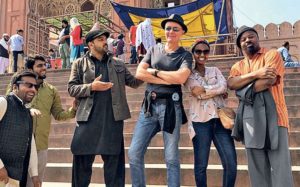
It’s not every literary festival where you have to check out the foreign office security warnings before you attend. It certainly doesn’t apply to Cheltenham. But then the literary festival which has just taken place in Lahore was no ordinary one.
For a start, there were guards with machine guns at every entrance. Lahore remains a city where foreign nationals have sometimes needed to exercise caution, as have the Pakistani locals.
I’ve been before and thought I knew my way around. So I felt particularly stupid – and alarmed – when I realised the taxi taking me from the airport to the hotel on my arrival was heading in the wrong direction. Moreover the driver only spoke Urdu and brushed aside my questions. Then he pulled into a lay-by and another younger and meaner-looking driver replaced him.
It was still early morning so there were not many people around. My state of paranoia was not helped by having been upgraded on the incoming Emirates flight and celebrating with a couple of vodka martinis which had left my judgement the worse for wear. Was I now about to be abducted before I’d given a single talk (on the new Hachette India edition of Nanda Devi)? I should have stayed in coach.
But as so often with the paranoia travellers feel on first arrivals, it soon evaporated. I had just been part of a regular shift change for sharing a car.
Irvine Welsh was one of many writers attending the festival with me and I decided to keep close in case any situation did ‘go off’, as they say on the hostile environment courses. Surely he’d be able to channel his inner Begbie and be useful in a crisis? Also he was always easy to spot in the crowd as the only person in the whole of Lahore wearing a pork pie hat.
Trainspotting is enormously popular in Pakistan. You can see why from the amphetamine charged way young men ride their motorbikes through the back streets of Lahore. Pakistanis like their literature direct and engaged. The session Irvine gave was packed.
Afterwards, I talked to a polite young man who was in awe of him and spoke in the modulated and careful English of the Lahori middle classes. ‘He is such a very important man. When I read his books, every word is like a bullet that goes through me. The only thing is, I have a problem when Irvine Sahib is speaking. I cannot understand a single word. It is his Scottish accent. It is like trying to understand someone speaking Bengali!’
The festival has come about through the sustained and admirable efforts of Razi Ahmed and his colleagues, who felt that Pakistan desperately needed a literary festival. There is little in the way of a publishing industry here compared to India and the need for freedom of discussion and debate is acute in a society still under the long shadow cast by military involvement in the state.
And Lahore was the obvious city to hold that festival. Kipling’s birthplace and his ‘city of dreadful night’ has become a huge metropolis of eleven million. It is also the literary and artistic hub of the nation, a counterpart to Karachi’s commercial success.
A packed session celebrated the memory of Asma Jehangir, the much loved human-rights lawyer and activist who died just a few weeks ago after a lifetime campaigning – and being imprisoned – for the cause of women and the disadvantaged in Pakistan. Her friend Ahmed Rashid told of how when he wrote his influential book Taliban – which because he wrote it pre 9/11, became essential reading after that particular situation ‘went off’ – the Pakistani government tried to suppress it, given their own close ties to Mullah Omar and friends.
Asma Jehangir came up with an idea. She decided to invent a fictitious literary prize and award it to Ahmed’s Taliban book. ‘Because then the Government will be unable to stop it being distributed.’
Over the two days of the festival, I became acutely aware of the malign effect of the dictatorship of General Zia in the 1980s. Many artists and writers told of how they had been imprisoned or needed to resort to subterfuge to survive those years – and of how freedom of expression is something that has continually to be fought for.
This is a free festival, like the one in Jaipur in India which I attended a few weeks ago, and at both the excitement and energy were palpable. British literary festivals can be decidedly blue-rinse and cautious these days. At Lahore, there were swarms of young students wanting to seize on writers and ideas, and hungry for debate.
As Pakastani novelist Sabyn Javeri put it when she spoke on a panel with Esther Freud, ‘literature helps us listen when we all do too much talking.’
———-

Haha Irvine Welsh’s Inner Begbie, you think he could control him?